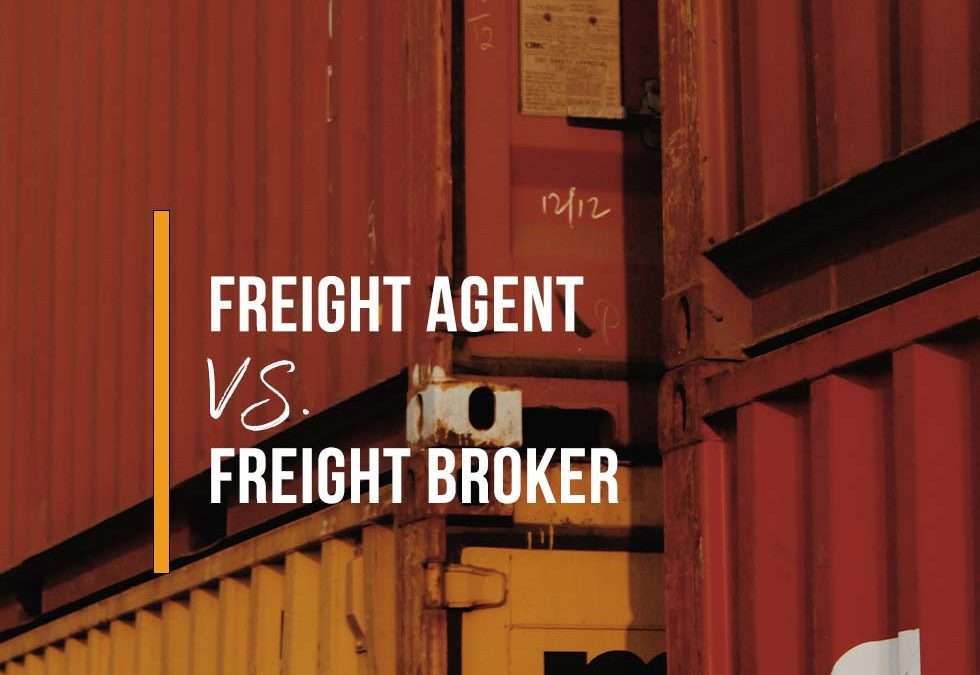
Freight Agent vs. Freight Broker: Key Differences
The freight industry is a cornerstone of global commerce, ensuring goods move efficiently from manufacturers to consumers. Within this industry, freight brokers and freight agents play vital roles in coordinating shipments and managing logistics. However, their responsibilities, earnings, and business structures differ significantly. Understanding these differences is crucial for those considering a career in freight logistics.
In this blog, we will explore the key differences, responsibilities, and earning potential of freight brokers and freight agents to help you determine which path is best suited for you.
Overview of Freight Agents and Brokers
Freight brokers and freight agents both act as intermediaries between shippers and carriers, but their roles are distinct:
- Freight Brokers operate as independent businesses, facilitating deals between shippers and carriers while ensuring regulatory compliance.
- Freight Agents work under licensed freight brokers, assisting with client acquisition and load management without holding their own licenses.
What is a Freight Broker?
A freight broker is a licensed professional who arranges transportation services between shippers and carriers. They do not own trucks but instead leverage their network to negotiate shipping rates and coordinate logistics.
Responsibilities
- Establishing relationships with shippers and carriers
- Negotiating freight rates
- Managing shipping logistics and ensuring timely deliveries
- Handling contracts, invoicing, and payments
- Ensuring compliance with transportation regulations
Licensing and Compliance Requirements
Freight brokers must obtain a Broker Authority License from the Federal Motor Carrier Safety Administration (FMCSA) and secure a $75,000 surety bond. Additional requirements include:
- Registration with the Unified Carrier Registration (UCR) system
- Maintaining general liability and cargo insurance
- Compliance with state and federal regulations
Earning Potential
Freight brokers earn commissions based on the volume and value of freight moved. Average earnings range from $50,000 to $200,000 annually, with top brokers making significantly more depending on their network and business scale.
According to a report by the U.S. Bureau of Labor Statistics (BLS), logistics and transportation businesses, including freight brokers, are expected to grow by 7% from 2020 to 2030, reflecting a steady increase in global trade
What is a Freight Agent?
A freight agent is an independent contractor who works under a freight broker’s authority. They help secure shipments, negotiate rates, and coordinate logistics but do not hold a brokerage license.
Responsibilities
- Identifying and acquiring clients (shippers and carriers)
- Negotiating freight rates on behalf of the broker
- Coordinating shipments and tracking deliveries
- Managing customer relationships and addressing issues
Qualifications and Requirements
Freight agents do not require formal licensing but must work under a licensed freight broker. Strong sales skills, industry knowledge, and networking abilities are essential for success.
Income Opportunities
Freight agents earn a commission-based income, typically receiving 40-70% of the brokerage’s commission. Annual earnings range from $30,000 to $100,000+, depending on performance and industry demand.
Freight Broker vs. Freight Agent: Key Differences
| Factor | Freight Broker | Freight Agent |
|---|---|---|
| License Required | Yes | No |
| Business Ownership | Owns Brokerage | Works under a broker |
| Liability | High | Low |
| Startup Costs | $10,000+ | Minima |
| Earnings | Higher Potential | Commission Based |
Similarities Between Freight Brokers and Freight Agents
Despite their differences, freight brokers and freight agents share several similarities, making both career paths attractive for those interested in logistics.
- Industry Role: Both act as intermediaries between shippers and carriers, ensuring smooth freight transportation.
- Sales and Negotiation: Success in both roles requires strong sales skills, as they must negotiate rates and secure contracts.
- Client Relationship Management: Both professionals need to build and maintain relationships with shippers and carriers.
- Technology Use: Freight brokers and agents use Transportation Management Software (TMS) and load boards to manage shipments and logistics.
- Commission-Based Earnings: Both earn based on the freight they move, making performance and networking crucial to income growth.
Pros and Cons of Being a Freight Broker
| Pros | Cons |
|---|---|
| Higher earning potential | High startup costs and financial risks |
| Full control over business decisions | Greater legal responsibilities |
| Ability to establish a brand | Extensive administrative tasks |
Pros and Cons of Being a Freight Agent
| Pros | Cons |
|---|---|
| Low financial risk and no licensing requirements | Lower earning potential |
| Flexible work schedule | Dependency on the broker |
| No liability for legal compliance | Limited control over operations |
Startup Costs: Freight Broker vs. Freight Agent
Understanding the financial investment required for each role is crucial when deciding between becoming a freight broker or a freight agent. Here’s a breakdown of the costs involved:
Freight Broker Costs
Freight brokers require a significant upfront investment due to licensing, compliance, and operational expenses. Key costs include:
- Licensing and Bonding: Obtaining a Motor Carrier (MC) number from the FMCSA costs around $300, while securing a $75,000 surety bond (BMC-84) typically requires an upfront payment of $2,000–$10,000, depending on credit history.
- Insurance and Compliance Fees: Freight brokers must maintain contingent cargo insurance, general liability insurance, and errors & omissions insurance, which can add $2,000–$5,000 annually to expenses.
- Office and Operational Expenses: Brokers often invest in Transportation Management Software (TMS), load boards, office space, phone systems, and marketing, which can total $5,000–$15,000+ depending on business size.
- Working Capital: Brokers must cover carrier payments before receiving shipper payments, so having at least $10,000–$50,000 in reserve is recommended.
Freight Agent Costs
Freight agents have significantly lower startup costs since they operate under an established brokerage. Key expenses include:
- Minimal Licensing Requirements: Agents do not need an MC number, surety bond, or insurance since they work under a broker’s authority.
- Office and Marketing Costs: While not mandatory, investing in a professional website, business cards, and advertising can help attract clients. Marketing costs range from $500 to $5,000, depending on strategy.
Technology and Tools: Some brokerages provide free access to TMS software and load boards, but independent agents may invest in load board subscriptions ($50–$300/month) for better access to freight opportunities.
How to Start Your Career as a Freight Agent or Broker
Entering the freight industry requires the right knowledge, licensing, and tools. Whether you choose to become a freight broker or a freight agent, here are the essential steps to get started:
1. Enroll in Freight Training Courses
Understanding freight logistics, regulations, and negotiation strategies is essential. Consider enrolling in freight broker training programs offered by reputable institutions such as DAT Freight & Analytics, Brooke Transportation Training Solutions, or Freight Broker Planet. These courses cover topics like:
- Industry regulations and compliance (FMCSA, DOT requirements)
- Freight negotiations and sales techniques
- Using Transportation Management Software (TMS) and load boards
- Building carrier and shipper relationships
2. Obtain Necessary Licenses (For Brokers)
If you plan to become a freight broker, you must meet legal requirements to operate independently:
- Apply for a Motor Carrier (MC) Number from the Federal Motor Carrier Safety Administration (FMCSA) (Application fee: $300)
- Secure a $75,000 Surety Bond (BMC-84), which requires an upfront cost of $2,000–$10,000 based on credit history
- Obtain freight broker insurance, such as contingent cargo and general liability coverage
- Register for a Unified Carrier Registration (UCR) and BOC-3 Process Agent filing
3. Partner with a Brokerage Firm (For Agents)
Freight agents do not need their own licenses or bonds since they work under a licensed freight broker. To start as an agent:
- Find a reputable freight brokerage that offers fair commission splits (typically 40%–70%)
- Sign an agent agreement, ensuring you understand commission structures, non-compete clauses, and access to TMS software
- Build relationships with shippers and carriers, as success in this role depends on networking and sales skills
4. Invest in Transportation Management Software (TMS)
TMS software helps manage freight shipments, track loads, and streamline operations. Many brokerages provide TMS platforms for their agents, but independent brokers may need to invest in:
- Load boards (DAT, Truckstop, 123LoadBoard) for finding carriers
- Freight management tools (AscendTMS, Aljex, or ITS Dispatch)
- Accounting software (QuickBooks, Axon) for invoicing and financial tracking
Frequently Asked Questions
What is another name for a freight agent?
A freight agent, sometimes also known as a sales agent, is a person whose primary role is to arrange freight movement between the carriers and customers. It can be one person or a group of people acting as independent contractors under a freight broker’s operating license.
What is the difference between a broker and an agent in shipping?
At the top level the difference between a freight broker and a freight agent is a freight agent is an individual or group of individuals that functions as an independent contractor under a freight broker’s operating license to move freight for its customers, while the freight broker moves freight under its own FMCSA
Which career offers higher earning potential?
Freight brokers generally have higher earning potential since they operate independently, but freight agents can also earn well through commissions, depending on their performance.
What are the startup costs for a freight broker vs. a freight agent?
Freight brokers need at least $10,000–$50,000 for licensing, insurance, and operations. Freight agents have minimal startup costs, mostly limited to marketing and office expenses.
Is broker and agent the same thing?
A real estate agent is licensed to help people buy and sell real estate and is paid a commission when a deal is completed. The agent may represent either the buyer or the seller. A real estate broker does the same job as an agent but is licensed to work independently and may employ agents.
Can a freight agent become a freight broker?
Yes, a freight agent can transition to becoming a freight broker by obtaining the necessary licensing, securing a surety bond, and setting up their own brokerage
How do freight brokers and agents find clients?
Both use networking, cold calling, load boards, and digital marketing to build relationships with shippers and carriers.
Final Thoughts
Freight brokers and freight agents both play key roles in logistics, but their responsibilities, earnings, and risks differ. Brokers have higher income potential but require licensing and investment, while agents enjoy lower startup costs and flexibility. Many work with freight brokerage companies to facilitate transactions, ensuring smooth coordination between shippers and carriers.
Your choice depends on your financial readiness and career goals. With the right skills and training, both paths offer rewarding opportunities in the freight industry



